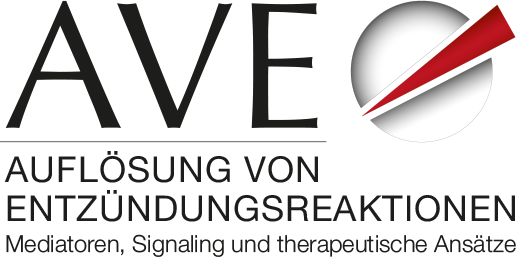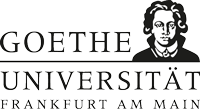Application as PhD student
The graduate school AVE aims to train PhD students in the field of resolution of inflammation. By providing a structured training programme coupled with an ambitious, cutting edge scientific research project we hope to attract young scientists towards this emerging field of science.
within the doctoral program GRK 2336
„Resolution of inflammation – mediators, signaling and intervention“
Our PhD training program integrates internationally recognized research groups in a unique collaborative frame work to study key mechanisms towards resolution of inflammation. It provides an excellent platform for research and training, using state-of-the-art technologies in biochemistry, molecular cell biology, physiology and pharmacology with enormous potential for translational research. The program is backed up by an individualized supervision and coaching program as well as topic-related seminars, practical courses, and transferable skill workshops. The positions are funded by the German Research Foundation (DFG GRK 2336/1) and the contracts are limited to three years with a payment according to E13 TV-G-U 65%.
Scientifically, 11 projects explore the mediators involved, identify signaling cascades, and tackle potential targets that promote resolution of inflammation (details below). In your application, please provide your preference for three projects you would like to work in.
We are seeking highly qualified, enthusiastic students holding a M.Sc. or equivalent degree with a suitable background in life sciences. Applicants must be fully proficient in English and should have completed their degree by October 2020. The application should include at least a motivation letter, CV and your degrees (with grading). Please address your applications as single pdf-file to
grk-ave@biochem.uni-frankfurt.de. Application deadline ends June 30th, 2020.
Project Details
Project 1:Mechanisms of IL-38 signaling that promote the resolution of inflammation
IL-1 family proteins are critical regulators of inflammation. The new IL-1 family receptor antagonist IL-38, which is released from apoptotic cells, promotes the resolution of inflammation partly due to its impact on pathogenic T cells such as γδ T cells. The project explores other mechanisms of the pro-resolving nature of IL-38, including its impact on the generation of auto-antibodies, and investigates the so-far elusive molecular mechanisms of IL-38 signaling. To achieve these goals in vitro models of immune cell activation, in vivo inflammation models, and patient material will be employed.
Project 2:The role of necroptosis versus apoptosis in the resolution of inflammation
Necroptosis and apoptosis differentially regulate immune responses. This project aims at elucidating the role of necroptosis versus apoptosis in the resolution of inflammation. The effects of necroptotic/apoptotic cells on the release of regulators of the resolution of inflammation and on the phenotype of cocultivated activated macrophages and DCs will be analyzed. In an in vivo model of zymosan-induced peritonitis, necroptotic/apoptotic fibroblasts will be injected i.p. to examine their effects on the resolution of inflammation.
Principle Investigator:
Prof. Dr. Simone Fulda
Institute for Experimental Cancer Research in Pediatrics
University Hospital Frankfurt
Website
Project 3:Non-hepatic organ’-to-liver cross communication in the pathophysiology and resolution of acetaminophen-induced liver injury
Acetaminophen (APAP)-induced acute liver injury (ALI) not only is a continual clinical problem but as experimental protocol a well-established paradigmatic model of drug-induced necroinflammation. Recent studies imply that inter-organ communication may affect course and resolution of APAP-induced ALI, though contributing mechanisms remain elusive. In this PhD project we aim to identify crucial biological signals (e.g. TLR ligands, (bacterial) metabolites, cytokines, hormones) that are derived from non-hepatic sources (e.g. intestine, lung, spleen, adrenal glands) during the acute phase of APAP-induced ALI and potentially feedback on the resolution phase of the intoxication.
Principle Investigator:
Prof. Dr. Heiko Mühl
Institute of General Pharmacology and Toxicology
Goethe-University Frankfurt
Website
Project 4:Transcellular biosynthesis of pro-resolving lipid mediators (SPM) in co-incubations of macrophages with dying neutrophils.
Biosynthesis of pro-resolving lipid mediators such as lipoxins and resolvins is dependent on the interplay of macrophage/granulocyte-derived 5- and 15-lipoxygenases (LO). Efferocytosis of dying neutrophils by 15-LO positive macrophages plays a central role in the resolution of inflammation. This projects aims to investigate the mechanism of SPM biosynthesis in co-incubations of human monocyte-derived macrophages with dying neutrophils. For this, monocytes will be isolated from human leukocyte concentrates, in vitro differentiated and co-incubated with neutrophils. Subsequently, expression and interplay of lipoxygenases and other enzymes involved in SPM biosynthesis as well as SPM formation will be investigated.
Principle Investigator:
Prof. Dr. Dieter Steinhilber
Institute of Pharmaceutical Chemistry
Goethe-University Frankfurt
Website
Project 5:Role of soluble epoxide hydroxylase (sHE) in macrophage polarization and resolution of Inflammation
The expression/activity of the soluble epoxide hydrolase (sEH) is important for optimal progenitor cell proliferation and long-term sEH inhibition is detrimental to progenitor cell proliferation, mobilization and vascular repair. We hypothesize that the sEH plays an important role in the regulation of myeloid cell function and aim to determine the role of the sEH in regulating macrophage polarization, lipid storage and foam cell development in the frame of atherosclerosis. Use will be made of available proteomic and metabolomic approaches, pharmacological tools as well as siRNA/CRISPR approaches and genetic mouse models e.g. the myeloid-specific deletion of the sEH.
Principle Investigator:
Prof. Dr. Ingrid Fleming
Institute for Vascular Signalling
Goethe University Frankfurt
Website
Project 6:Translational regulation of the resolution of inflammation in macrophages
Gene expression changes during the course of inflammation and its resolution are rather well established. There is ample evidence that especially during the resolution phase RNA expression changes are strongly controlled on a post-trancriptional level. In the present project, we aim to elucidate the translational changes in macrophages during the resolution of inflammation and characterize the functional impact of translational changes on the course of the resolution phase.
Project 7:Pro-resolving mediators in mast cells
Mast cells are known for their proinflammatory properties i.e. in promoting allergies. However, they have also the power to suppress immune answers and to promote resolution of inflammation. Here, we aim to identify signals that induce the selective release of antiinflammatory and pro-resolving mediators from mast cells as well as the downstream effector cells targeted by these mediators.
Principle Investigator:
Prof. Dr. Klaus Scholich
Institute of Clinical Pharmacology
Goethe-University Frankfurt
Website
Project 8:The impact of IKKe inhibition on the velocity of atherosclerosis progression: Do T-cells play a role?
In a running PhD project of the graduate school, we investigate the role of IKKe in inflammatory processes of peritonitis and atherosclerosis in mice. Our current results indicate that a deletion of IKKe ameliorates the inflammatory symptoms and leads to an improved health status. Interestingly, by examining immune cells in IKKe knock-out and wild type mice we detected a significantly increased level of specialized T-cells in several tissues of IKKe-depleted mice. In a follow-up project, we now intend to investigate 1. if the effects of IKKε deletion can be mimicked by the specific IKKe inhibitor drug amlexanox and if this drug can enhance the resolution of inflammation, 2. if IKKe deletion in mice slows down the progression of atherosclerosis and 3. if T-cell subsets play a role in IKKe-mediated effects on inflammatory processes.
Principle Investigator:
Prof. Dr. Ellen Niedernberger
Institute of Clinical Pharmacology
Goethe-University Frankfurt
Website
Project 9:Exploitation of the carbazole-derived kinase inhibitor C81 to promote the resolution of inflammation
Chronic inflammatory diseases are characterized by an impaired resolution of inflammation. This project aims to make use of a natural product-derived kinase inhibitor (synthetic carbazole derivative C81) to promote the resolution of inflammation. The pharmacological action of C81 will primarily be investigated in vitro in human leukocytes: In particular, the influence of C81 on cell functions of macrophages and neutrophils as well as on macrophage polarization processes will be analyzed in detail. Moreover, we will focus on the underlying mechanisms of action with a special emphasis on the kinase signaling network involved.
Principle Investigator:
Prof. Dr. Robert Fürst
Institute of Pharmaceutical Biology
Goethe-University Frankfurt
Website
Project 10:Role of nuclear repressors in the resolution of vascular inflammation
We have identified that some lipid mediators elicit anti-inflammatory responses by the activation of nuclear receptors. Preliminary data suggest that subsequent recruitment of nuclear repressors to segments of the DNA eventually mediate the resolution response. In the project, vascular nuclear repressors will be studied for their function in inflammation resolution in cultured vascular cells and mouse models of the cardiovascular system.
Principle Investigator:
Prof. Dr. Ralf P. Brandes
Institute of Cardiovascular Physiology
Goethe University Frankfurt
Website
Project 11:Reg3b in regeneration and cellular transformation
Using a new transgenic model of Reg3b overexpression in the intestine, we could observe a profound effect of Reg3b in wound healing in an acute model of colitis. Current efforts aim to characterize the exact molecular mechanisms that are controlled by Reg3b with a particular focus on changes in the tumor microenvironment. Moreover, we will elucidate the impact of Reg3b on sporadic intestinal tumorigenesis.
Principle Investigator:
Prof. Dr. Florian Greten
Georg-Speyer-Haus
Website



